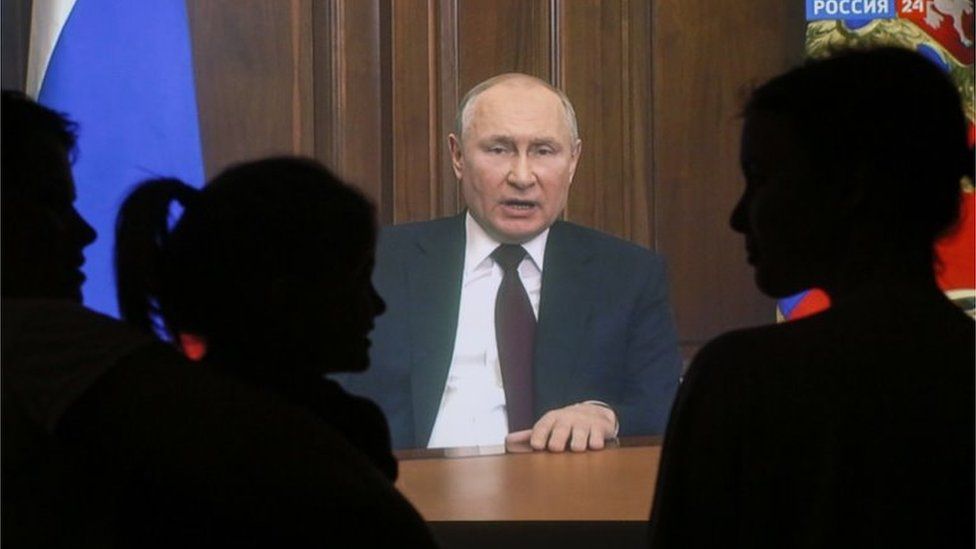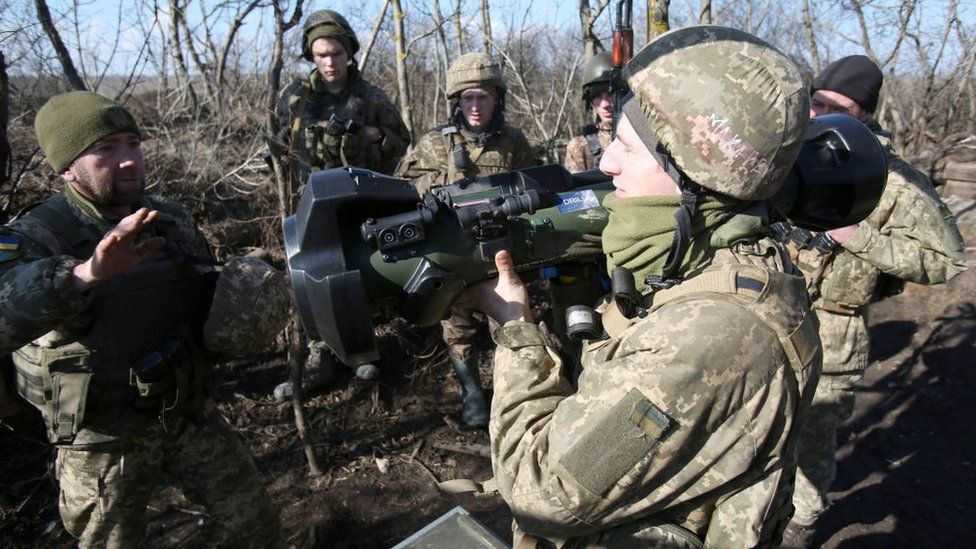Putin's angry speech rewriting Ukraine's history
 Image source, EPA
Image source, EPARussian president Vladimir Putin's late-night televised speech from the Kremlin, just hours after talks of a summit, was laced with anger, historical grievances and challenges to the West, The BBC's Sarah Rainsford and Paul Adams in Kyiv give their verdict.

'Like a bid to run for Ukraine president'

This speech was Putin the angry; impatient and directly threatening. It felt like Russia's president was getting 20-odd years of hurt off his chest and hitting back.
"You didn't want us to be friends," was how he put it to the West, "but you didn't have to make an enemy of us."
There was a lot we've heard before, repackaged for this moment when he knows he has maximum attention.
With this speech, Putin was clearly ceding no ground on his key security demands: Nato expansion must be rolled back, and Ukrainian membership is a red line. He complained that Russia's concerns had been ignored as irrelevant for years and accused the West of trying to "contain" Russia as a resurgent global force.
Mr Putin's focus on Ukraine felt obsessive, like a man who thinks about little else. At times it sounded like a bid to run for president there, it was so detailed.
And, of course, there was his re-writing of Ukrainian history, to claim it has never really been a state. In today's context, that had deeply ominous overtones.
Recognising the two breakaway regions of Ukraine could mean Russian troops go in openly, very soon - invited as "peacemakers". Or there could be a pause, as the Russia leader waits to see his opponent's next move.
In all this, Ukraine is the battleground. But it's also a game of brinkmanship between Russia and the West, rapidly building to a showdown.
'A piece of theatre with everyone playing their role'
The Russian Security Council meeting earlier was a piece of theatre in which everyone had their allotted role and their script.
Russia's most senior officials sat in an awkward-looking semi-circle before Vladimir Putin, called upon one by one to step up to the mic and tell him what he wanted to hear.
In the story they spun, Russia was being compelled to step in to protect the people of the Donbas - many of them now Russian citizens - from the deadly threat posed by Kyiv, by giving formal recognition to the breakaway regions.
 Image source, Getty Images
Image source, Getty ImagesThe word genocide was uttered again and Ukraine's government described as puppets of the West.

'A Ukraine out of a fever dream'

Much of Vladimir Putin's speech about Ukraine sounded like a fever dream. A nightmarish vision of a country economically crippled, utterly corrupt, bent on developing nuclear and other weapons of mass destruction and ungrateful for all the generous attention lavished on it by Russia since independence.
This wasn't new. He wrote a lengthy article last summer, making many of the same arguments.
 Image source, Getty Images
Image source, Getty ImagesBut that didn't make it any less shocking to hear. It underlined, for anyone with any lingering doubt, that Mr Putin is speaking from a very different place. This is not just a different slant on history. At times it felt like a parallel universe.
But are there lessons too for the West? Why, he asked, did Nato make an enemy of Russia?
The Western alliance certainly never set out to do any such thing. But the Russian leader's broadside underlined, once more, that the Kremlin remains deeply resentful of the way history panned out. Nato's gain was, in Mr Putin's zero-sum world view, Russia's loss.
France's Emmanuel Macron spoke of addressing "the mistakes of the past" after he met Mr Putin in Moscow two weeks ago. Suggesting, perhaps, that the West bears some responsibility for allowing this relationship to sour so badly.
If and when the crisis over Ukraine can be resolved, how can Nato and Russia pick up the pieces?
In a final flourish, Putin said he would first mull over what he'd heard, then make his call. Which sounded rather like a challenge to the US to try and stop him.



No comments